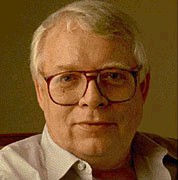Algis Budrys (Algis Budrys)

Called “AJ” by friends, Budrys was born Algis Budrys in Königsberg in the then East Prussia, to a family which considered itself Lithuanian rather than German. In 1936, when Budrys was five years old, his father Jonas Budrys was appointed as the Lithuanian consul general in New York. Jonas Budrys continued to hold that position, even though Lithuania was occupied by Nazi Germany and then annexed by the Soviet Union and made into a Soviet Republic – since the United States continued to recognize the pre-World War II Lithuanian government and the exile Lithuanian Diplomatic Service was subsidized by State Department. During most of his adult life, Budrys held a captain’s commission in the Free Lithuanian Army. Algis Budrys was educated at the University of Miami, and later at Columbia University in New York. His first published science fiction story was “The High Purpose”, which appeared in Astounding Science Fiction in 1952. Beginning in 1952 Budrys worked as editor and manager for such science fiction publishers as Gnome Press and Galaxy Science Fiction. Some of his science fiction in the 1950s was published under the pen name “John A. Sentry”, a reconfigured Anglification of his Lithuanian name. Among his other pseudonyms in the SF magazines of the 1950s and elsewhere, several revived as bylines for vignettes in his magazine Tomorrow Speculative Fiction, is “William Scarff”. He also wrote several stories under the names “Ivan Janvier” or “Paul Janvier.” He also used the pen name “Alger Rome” in his collaborations with Jerome Bixby.
Algis Budrys’s 1960 novella Rogue Moon was nominated for a Hugo Award, and was later anthologized in The Science Fiction Hall of Fame, Volume Two (1973). His Cold War science fiction novel Who? was adapted for the screen in 1973. In addition to numerous Hugo Award and Nebula Award nominations, Budrys won the Science Fiction Research Association’s 2007 Pilgrim Award for lifetime contributions to speculative fiction scholarship. In 2009, he was the recipient of one of the first three Solstice Awards presented by the SFWA in recognition of his contributions to the field of science fiction. Budrys was also a critic for Galaxy Science Fiction and The Magazine of Fantasy and Science Fiction, a book editor for Playboy, a longtime teacher at the Clarion Writers Workshop and an organizer and judge for the Writers of the Future awards. In addition, he worked as a publicist; in a famous publicity stunt, he erected a giant pickle on the proposed site of the Chicago Picasso during the time the newly arriving sculpture was embroiled in controversy. Algis Budrys was married to Edna Duna; they had four sons. He last resided in Evanston, Illinois. He died at home, from metastatic malignant melanoma on June 9, 2008.
Born
- January, 09, 1931
- Königsberg, Russia
Died
- June, 06, 2008
- USA
- Evanston, Illinois
Cause of Death
- metastatic malignant melanoma
Cemetery
- Maryhill Catholic Cemetery & Mausoleum
- Niles, Illinois
- USA

